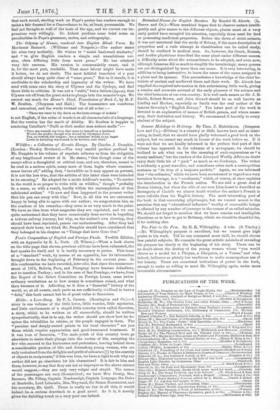The Odyssey of Homer, rendered into English Blank Verse. By
711ordattnt Barnard. (Williams and Norgate.)—The author states his aims very modestly. He wishes to " assist backward students ;" and " to give English readers a simple and unambitious ver- sion, often differing little from mere prose." He has attained very fair success. His version is commendably exact, and it is, for the most part, readable. That more labour might have made it better, we do not doubt. The most faithful translator of a poet should always keep quite clear of "mere prose." But as it stands, it is creditable to the scholarship and ingenuity of the writer. We have read with some care the story of Ulisses and the Cyclops, and find there little to criticise. It was not a "cubit," but a fathom (gryulte), that Ulysses cut off from the great stake to plunge into the monster's eye. We cannot say much for Homer's Iliad, Translation of Book I., by M. P. W. Boulton. (Chapman and Hall.) The hexameters are cumbrous and unmusical, and the words twisted out of all order :—
" These my tears by thy darts on the hosts avenge of Achaia"
is not English, if the order of words is at all characteristic of a language. But the version has the merit of fidelity. Mr. Boulton is happier in rendering Catullna's "Nulli as dicit miller mea nubere malls ":—
"Unto me voweth my love, that none to herself as a husband Would she prefer, though e'en wooed by Olympian Jove; Yea, so voweth her tongue; but a mistress' words to an eager Lover in hurrying wave need to be written, and wind."


































 Previous page
Previous page